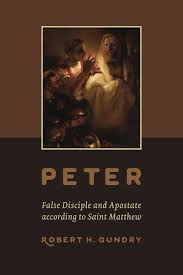 Robert Gundry in a newly published book, Peter: False Disciple and Apostate according to Saint Matthew, describes himself as “a conservative evangelical Christian” with an interest in “the understanding that makes best sense of Matthew’s text when it comes to Peter.” His argument is that
Robert Gundry in a newly published book, Peter: False Disciple and Apostate according to Saint Matthew, describes himself as “a conservative evangelical Christian” with an interest in “the understanding that makes best sense of Matthew’s text when it comes to Peter.” His argument is that
Matthew portrays Peter as a false disciple of Jesus, a disciple who went so far as to apostatize; that Matthew does so to warn Christians against the loss of salvation through falsity-exposing apostasy; that this warning fits the Matthean theme of apostasy-inducing persecution; and that the danger of apostasy fits the further Matthean theme of the ongoing presence of false disciples in the church . . . till the end.
That’s quite a daring proposal for most of us who have long viewed the Gospel of Matthew as the one gospel that does more than any other to exalt the role of Peter in the foundational history of the Church. Some of us have wondered if the Gospel of Mark was meant to be having a dig at the disciples for their faithlessness, and some have seen the Gospel of John as subtly suggesting that Peter’s spiritual qualities were somewhat inferior to those of “the Beloved Disciple”. But the Gospel of Matthew (henceforth “Matthew”) is famous for Jesus pronouncing that he was giving Peter the keys of the Kingdom of Heaven and “upon this rock I will build my church”.
So any suggestion that Matthew viewed Peter as an apostate is going to have some explaining to do.
First question: if Matthew thought Peter was a false apostle then why didn’t he say so directly? Continue reading “Peter as Apostate Apostle in the Gospel of Matthew?”
